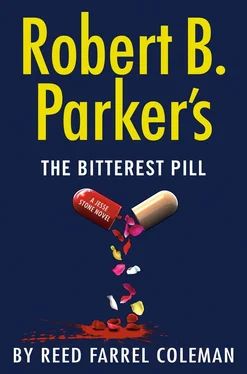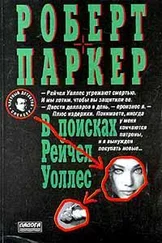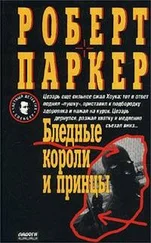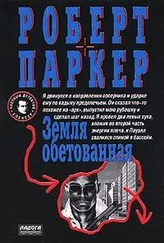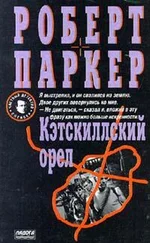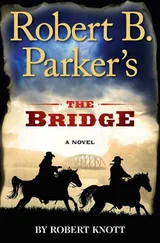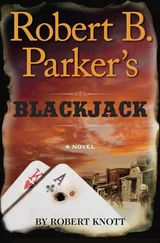Reed Farrel Coleman
Bitterest Pill
Fifty years and a trillion dollars after we declared the war on drugs, drugs are now more prevalent, cheaper, and more potent than ever before. If this is victory, I’d hate to see defeat.
Don Winslow
The world had changed. Paradise had changed. Most significantly for Jesse Stone, his life had been turned upside down. He was a man wise enough to know that life comes with only one guarantee — that it would someday end. As a Robbery Homicide detective for the LAPD and as the longtime chief of the Paradise PD he had seen ample proof of that solitary guarantee written in blood, in wrecked bodies, and in grief. It wasn’t that long ago that his fiancée’s murder had given Jesse all the proof he would ever need. He remembered an old Hebrew proverb about how people’s planning for their futures was God’s favorite joke. Still, at an age when most men were steeped in haunting regrets of what could have been and what they might have done, Jesse had been given the most unexpected gift a loner like him could receive. Cole Slayton, Jesse’s son, had arrived in town just as Paradise was shedding its old skin and transforming itself into the place Jesse was currently seeing through the night-darkened windows of his latest Ford Explorer.
This end-of-shift drive through the streets had long been a ritual of his. A way to make sure things were intact and that the citizenry could rest well. Still, Jesse didn’t fool easily, and he was especially keen not to fool himself. He understood that Paradise was a different place than the village he’d come to all those years ago as a man looking for a fresh start. In those days, Boston, less than twenty miles south, seemed a million miles away, a world apart. Nowadays, Paradise, though not yet quite a suburb of Boston, felt much closer than ever before. As the big city’s influence crept north, it brought a new vibe to town that not all the natives of Paradise appreciated. Jesse had mixed feelings about the shift. Although he had long ago settled into the seaside rhythms of the town, Jesse enjoyed the new urban vitality, the pace and diversity Boston’s encroachment brought with it. But as Vinnie Morris had once warned him, as Boston would come toward Paradise, so, too, would come its sins. Vinnie had phrased it less artfully.
Jesse had already seen some evidence of that. Nothing dramatic. No crime wave, per se. Yet there was an increase in urban gang activity in Paradise and the surrounding towns. Graffiti and vandalism had been on the rise, as had auto theft. Drug arrests had also ticked up and the local cops now carried naloxone with them. None of the crime particularly scared Jesse. He didn’t overreact, as the mayor and town selectmen had, nor had he turned a blind eye. He had prepared his cops as best he could. He had joined with the chiefs of the nearby towns and the state police to work out strategies to deal with the changes in the criminal landscape.
At the moment, though, it was Paradise’s recent past and hatred, humanity’s most ancient foible, that occupied Jesse’s thoughts. He was driving by the empty lot where the old meetinghouse once stood. Several months ago, a white supremacist group had come to town with mad dreams of sparking a national race war. They hadn’t achieved their twisted goals but had left a trail of destruction in their wake. One of the casualties was the old meetinghouse, a building that had once been used as a safe haven for runaway slaves along the route of the Underground Railroad. It had been blown to bits by a powerful bomb blast. Jesse shook his head because more than the old building had been lost. Paradise had been shaken to its core. Families had been terrorized, several people were dead, and he’d been forced to fire Alisha, his best young cop. There was a big debate going on about whether to faithfully reconstruct the old place, create some sort of memorial, or let the past go altogether and sell the lot for new construction. Those were decisions above Jesse’s paygrade, and he was glad of it. What concerned Jesse was the notion that the destruction might be an omen of things to come, that the world’s ills, not only Boston’s, were headed for Paradise’s doorstep. He turned the corner, leaving the ghost of the old meetinghouse in his rearview mirror.
These ritual drives through Paradise had once been a prelude to a different and more personal ritual — drinking. Even now, remembering the steps of the ritual, he got a jolt. Throwing off his blue PPD hat and jacket as he entered his house, tossing the mail down on the counter, approaching the bar, twisting the cap off the smooth, rectangular bottle of Johnny Walker Black Label, pouring the beautiful amber fluid over ice, the gentle snap and crackle as the room-temperature scotch hit the ice, the clinking of the ice as he swirled the glass, sniffing the perfectly blended grace notes from the charred oak barrel in which it had aged, lifting the glass to toast Ozzie Smith, and then, finally, the first magic sip. He could almost feel it, the warmth at the back of his throat, spreading down to his belly, through his body, and reaching his fingertips. But Jesse hadn’t had a drink in many months because his new nightly ritual involved sharing a room with fellow alcoholics who gave one another the strength they needed to stay sober.
At first he had driven to meetings down in Boston at an old Episcopal church. That’s where he’d met Bill, his sponsor. But making that trek several times a week had become unwieldly and impractical. Besides, Jesse’s drinking hadn’t ever been much of a secret to begin with. The only people in Paradise who didn’t know about Jesse’s struggles with the bottle were transplants from Boston and children under ten years of age. So he’d recently begun attending AA meetings in and around Paradise. He was headed to a meeting in Salem when the phone rang. The Explorer’s display showed the call was from the Paradise Police Department. He pressed the button on the steering wheel.
“What?”
It was Molly working the desk. “There’s trouble, Jesse.”
“There’s always trouble. What kind?”
“The worst kind.”
“Tell me.”
“Patricia Mackey just found her daughter... unresponsive. She’s dead, Jesse.”
“Jeez, no.” Jesse pulled over. “Where? How?”
“In her bedroom. And, Jesse...”
“Uh-huh.”
“Suit’s there now. He found drug paraphernalia.”
“On my way.”
Jesse had been a cop for too long to think anything connected with drugs was an anomaly. And suddenly Vinnie Morris’s warning rang loud as cathedral chimes in Jesse’s ears.
A thousand things went through Jesse’s mind as he pulled up to the Mackey place, and not a single damn one of them was any good. He didn’t need to be a parent to know that a mother and father should never have to put a kid in the ground before them. Not ever, not for any reason. Drugs, disease, a careless accident, what did that matter? And now that Jesse was a father, Heather Mackey’s death cut even deeper than it had during all the previous cases he had worked involving the death of a child. He hadn’t been there to watch Cole grow up, hadn’t known the boy existed until a few months ago, but that was beside the point. The bond he felt couldn’t have been stronger had he been in the delivery room to hear Cole cry or to watch him open his eyes for the first time.
Suit Simpson greeted Jesse at the curb.
“Hey, Jesse. Molly told me you were on your way.”
“I see the ME’s men are here.” Jesse pointed at the van. “ME inside?”
Suit nodded. “Peter, too. He’s working the scene.”
Читать дальше
